

Conversations that matter

“Silence is one of the great arts of conversation.”
– Marcus Tullius Cicero
Editorial
What is The Salvation Army?
The Salvation Army, an international movement, is an evangelical part of the universal Christian Church.
Vision Statement
Wherever there is hardship or injustice, Salvos will live, love and fight alongside others to transform Australia one life at a time with the love of Jesus.
Mission Statement
The Salvation Army is a Christian movement dedicated to sharing the love of Jesus by:
• Caring for people
• Creating faith pathways
• Building healthy communities
• Working for justice
The Salvation Army Australia acknowledges the Traditional Owners of the land on which we meet and work and pay our respect to Elders, past, present, and future. We value and include people of all cultures, languages, abilities, sexual orientations, gender identities, gender expressions, and intersex status. We are committed to providing programs that are fully inclusive. We are committed to the safety and wellbeing of people of all ages, particularly children.

We all matter
Our world is a noisy, busy and hurried place. Time for regular, genuine, deep and meaningful conversation is rare. Even brief but authentic chats with those around us, and others we meet, are often not daily occurrences.
Every person has a story worth listening to, and friendship, along with a sense of belonging and community, often begins with being heard. Listening to others and engaging in heartfelt chats can restore our humanity. The connections they bring can help prevent the social isolation and loneliness that impact so many people in our communities today.
Scan here to connect with The Salvation Army services
Founders: William and Catherine Booth
Scan here to subscribe to Salvos Magazine.
Salvation Army World Leaders: General Lyndon and Commissioner Bronwyn
Buckingham
Territorial Leader: Commissioner Miriam Gluyas
Secretary for Communications and Editor-In-Chief: Colonel Rodney Walters
Publications Manager: Cheryl Tinker
Editor: Simone Worthing
Graphic Designer: Ryan Harrison
Enquiry email: publications@salvationarmy.org.au
All other Salvation Army enquiries 13 72 58
Press date: 19 June 2025
Printed and published for The Salvation Army by Commissioner Miriam Gluyas at Focus Print Group, Chester Hill, NSW, Darug Nation lands.
In this edition, we feature stories about conversations and the joy, dignity, connection and hope they can bring. Faye Michelson also writes about competitive conversations and the power of listening to open up communication, rather than shut it down.
Krzystof’s story reminds us that being heard, seen and responded to can be transformative. He, like all of us, just wanted to matter. We all matter to God, and he has created us for relationships and communication – with him and with each other.
To find out more, go to salvosonline.org.au
Simone Worthing Editor
Conversations that matter
by Commissioner Miriam Gluyas
My day has been full of conversations.
The lady who checked me out of the motel:
“How was your stay with us?”
“Delightful, thank you!”
“Is there anything else that I can help you with?”
“No, just brilliant thank you. I’ll come again”
The golf cart driver who kindly drove me to an event:
“Well, look at you. I will be delighted to take you to the event. In fact, get in and pretend you are driving the cart, and I’ll get the photo. Just make sure you put my photo in your magazine.”
“I can see how you get to do this role. You’re a natural. You can drive me any day and I would love to get to know you better.”
“It’s my ideal job in retirement. I chat to people all day long.”
The person in politics, whom I don’t really know but had a short conversation that led to depth about things that matter:
We both chat, both share our thoughts and insights, and both get to share quite deep and personal stories about our families. I’m glad I had that conversation. In a short time, I know and understand some really significant things.
Another conversation of great depth: Then comes another conversation of

great depth with someone I know well, about matters that deeply concern us both. What has been, what could be ...
And it’s only lunch time!
Conversations matter! Sometimes brief, sometimes fun, some to gain understanding and insight and some with great depth. And good conversations are about two or more people having their chance to share and ask questions, to build relationship, rapport and trust. Why do they matter? The deeper we go, the more we understand. Our stories are so different. We see another side of people who often say they are “fine”.
And what else? Questions matter. Kindness matters. Caring matters. Understanding matters. Depth matters. People matter. In a world where so many are lonely and isolated, everyone needs someone to talk to. We all matter.
What conversations have you had today? Why do they matter?
Commissioner Miriam Gluyas leads The Salvation Army in Australia
Connecting conversations
Harnessing the power of mutual communication
by Jo-Anne Brown
Earlier this year, we experienced a weather event that meant cancelling some of our regular group gatherings. These groups typically meet monthly at our home, where we gather to share, laugh, and listen together, sharing our thoughts, experiences, and life stories.
I was disappointed at the time, but our thoughts were occupied with the approaching cyclone. By the end of the month, however, despite text messages checking in with each other, I realised I felt quite disconnected. I missed the conversation and connection with people who know me well and whom I care deeply about.
Created for connection
We are created to connect with others around us, to form community, and to love and be loved. Our brains are literally
wired for connection and compassion, and when all is well in our inner world, we operate from a place of deep care, feeling for one another and being ‘in sync’. We feel what others feel and can respond to that.
When we connect this way, we are at our best and make the world a better place. While staying connected through social media or online is sometimes the only option (think COVID 2020!), nothing compares to being together in person and sharing deeply in each other’s lives.
Mutual listening
The need for deep listening and the awareness that we are not very good at it was recognised long before social media, mobile phones and internet availability made it easy for us to contact each other, but not necessarily to connect.
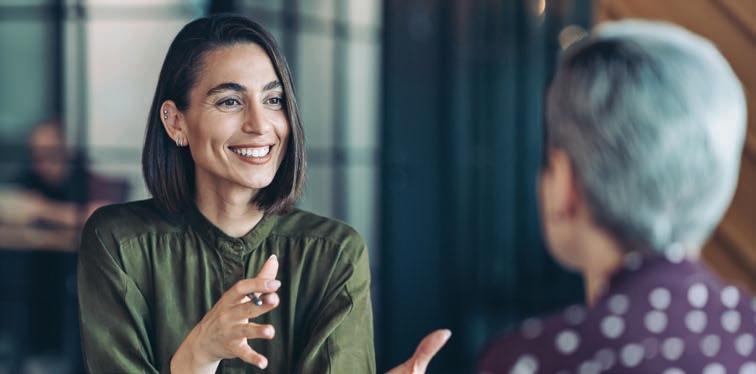

Almost 100 years ago, Dietrich Bonhoeffer, a pastor and theologian, observed that conversations often focused more on talking and interrupting than on listening. He regarded mutual listening as the foundation for true community – listening where each person feels heard and valued. He believed that truly caring about others means listening to them, so we can understand and build relationship with them.
Genuine relationship sustains us, builds resilience, and supports our total wellbeing. In a world filled with uncertainty and turbulence, strong, supportive relationships help us to stand with confidence and hope. It’s much easier to talk than to listen –partly because we all long to be heard and often feel that no one is really listening to us. It’s also partly because we don’t often see deep listening modelled. In most social
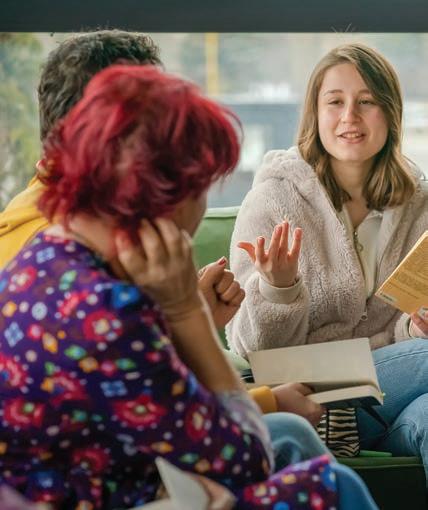
settings, it isn’t the norm. Real friendship, or a genuine relationship in community, however, is a mutual experience.
Heart listening
Connecting compassionately with others requires genuine listening; but more deeply, it’s a heart attitude. It arises from a real sense of the sacredness of each human being and a desire to honour the beauty and uniqueness of the person in front of us. This involves empathy for the other person’s experiences and feelings.
When we listen to create connection, we offer our attentiveness to the other and choose to be deeply present for them. In a practical sense, when I am in conversation with someone, I focus my attention on them more than on what is going on around me, and more on the point I want to make than on any other aspect. I’m also listening for the words
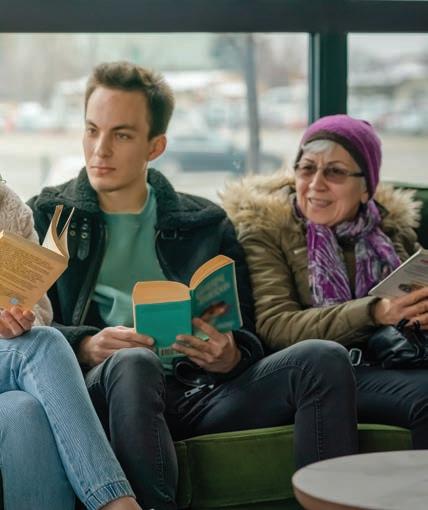
that are not spoken, for what might be hard for the other person to express.
From a heart perspective, this kind of listening means creating space for that person. We don’t need to rush in to fill a silence, or to fix a problem (or fix the person!) – we can simply be with them, be present to what they are sharing with us, and let them know they matter.
Connecting with others through deep listening goes beyond merely acquiring a set of skills. It involves genuinely caring for others, believing that relationships matter, and knowing that the world becomes a kinder and gentler place when we are connected to those around us.
The kind of listening that deepens relationship requires letting go of certain attitudes. When we are truly attentive to someone, we let go of our own need to be right, to feel important, and to be heard.

We don’t need to compete with someone else’s story or vie for attention. We choose to simply be there for the other person, so they know they are seen and heard.
It’s not only in this world of social media and online communication that we need to relearn the skills for deep listening.
Slow to speak
In the 1st Century, James wrote in the Bible, “Be quick to listen, slow to speak, slow to anger” (James chapter 1, verse 19).
Since the beginning of time, our hearts’ desire and our internal wiring have longed for deep connection: to be known, to be heard, to love and to be loved. This connection with one another makes us whole and healthy, gives us hope and strength, and enables us to appreciate the beauty and magnificence of the world around us and of our fellow human beings.
Rebuilding connection
Overcoming the epidemic of loneliness
People often associate social isolation and loneliness with the COVID-19 pandemic, but this has been a long-standing issue in our community. Social isolation and loneliness are distinct yet related concepts. Social isolation is a measure of meaningful social connection and interaction, while loneliness is the unpleasant feeling that can arise from social isolation.
Social isolation can result from several factors, including geographical remoteness, life transitions and societal changes.
Many older Australians experience loneliness and social disconnection due to factors such as retirement, loss of loved ones and physical health limitations. Young people in Australia also face challenges related to social isolation. Despite being more connected than ever through online platforms, many young people report feelings of loneliness and disconnection, which can impact their self-esteem, mental health and sense of belonging.
There is a clear relationship between
1 IN 20
In August 2022, about one in 20 (4.8 per cent) Australians reported never meeting socially with friends, colleagues or relatives. This is more than double prepandemic levels of isolation.
financial hardship, social isolation and loneliness. People experiencing poverty or financial hardship often end up socially isolated and develop feelings of loneliness.
People experiencing loneliness have a higher risk of mental ill health, particularly depression and anxiety. This can start a feedback loop, as people who are anxious or feeling depressed may isolate themselves further as a coping mechanism. Loneliness can also have other implications, including poorer physical health, pain and sleep disorders.
Social isolation and loneliness can also lead to other forms of disadvantage, including difficulty maintaining employment, housing and other relationships. This highlights the importance of fostering meaningful and purposeful social connections, alongside a sense of belonging and community inclusion (while providing accessible resources and support services), so that all individuals feel valued, connected and supported in their communities.
Young people (aged 18-24) were most likely to report experiencing high levels of loneliness throughout the pandemic.
WE HAVE THE POWER TO MAKE A DIFFERENCE
URGE ACTION FROM OUR GOVERNMENTS
Governments can lead the conversation on social isolation and loneliness by creating frameworks of accountability, such as developing ways of measuring social isolation and loneliness and appointing a minister responsible for minimising social isolation.
All levels of government can work to address service gaps that may push people experiencing hardship –including family and domestic violence, homelessness, substance misuse, and mental health issues – into isolation and loneliness.
WE CAN IMPLEMENT CHANGE IN OUR COMMUNITY AND WORKPLACES
Community groups have significant power to combat loneliness and social isolation. This could involve targeted outreach to engage more participants in events or activities, or checking in
TWICE AS LIKELY TO HAVE CHRONIC DISEASE
People experiencing moderate loneliness are twice as likely to suffer from chronic disease compared to those who aren’t lonely.
and fostering deeper connections with existing members.
In our workplaces, we can provide constructive social interactions among employees and see our businesses as opportunities for social connection with customers and community members.
To foster connection, social programs need to be welcoming to a broad cohort and flexible enough to adapt to a specific community’s needs.
Community groups can collaborate and interconnect to support those with more intensive needs.
WE CAN HAVE INFLUENCE IN OUR PERSONAL LIVES
We can address social isolation and loneliness in ourselves and our community by being open to building social connections across all aspects of our lives. We can also learn how to identify and support someone experiencing social isolation and loneliness. This can profoundly impact the people around us.

46%
TOO EMBARRASSED TO ADMIT FEELING LONELY
46 per cent of people say they are too embarrassed to admit it to others when they feel lonely.
Competitive conversation
How one-upmanship silences meaningful connection
by Faye Michelson
Have you ever found yourself in a competitive conversation? You might be sharing some news with a friend, colleague, or family member, and it could go something like this:
You: I’ve been having pain in my knee for a while, and it’s started to swell up. My GP said I needed an arthroscopy.
Other person: Oh yes, my friend’s knee was so swollen – so much more than yours – that she had to have an emergency arthroscopy.
You: That’s no good. I had the procedure last week, and they found the pain was because of osteoarthritis.
OP: Oh, my friend had that, too, except they said it was the worst case of arthritis they’d ever seen. Or have you ever tried to share some good news with someone who barely acknowledges your words, just using what you say
as a springboard for their own stories?
You: Remember my youngest daughter, the one who finished her master’s degree in communication last year? She has just been offered a great job.
OP: My niece’s best friend has too! She has a doctorate – we call her Dr Jessie, ha-ha – well, she has just started at some swish place in the city. Such a clever young woman!
Shutting down
Groan. We’ve all been in that frustrating circular style of conversation where we feel we’re not being heard. And, dare I say it, there are probably times when we were that person, trading story-forstory instead of listening.
Keeping our mouths shut and our ears open can be hard. If we are so busy thinking about what we want to say next, then

we’re not listening to what we are being told. There are times when conversations need to be one-sided, when there is a talker and a listener, times when someone sharing news does not want to hear about anyone else’s experiences. I know that personally.
A couple of years ago, I rang a friend to update
PHOTO COURTESY KAREN MASTERS
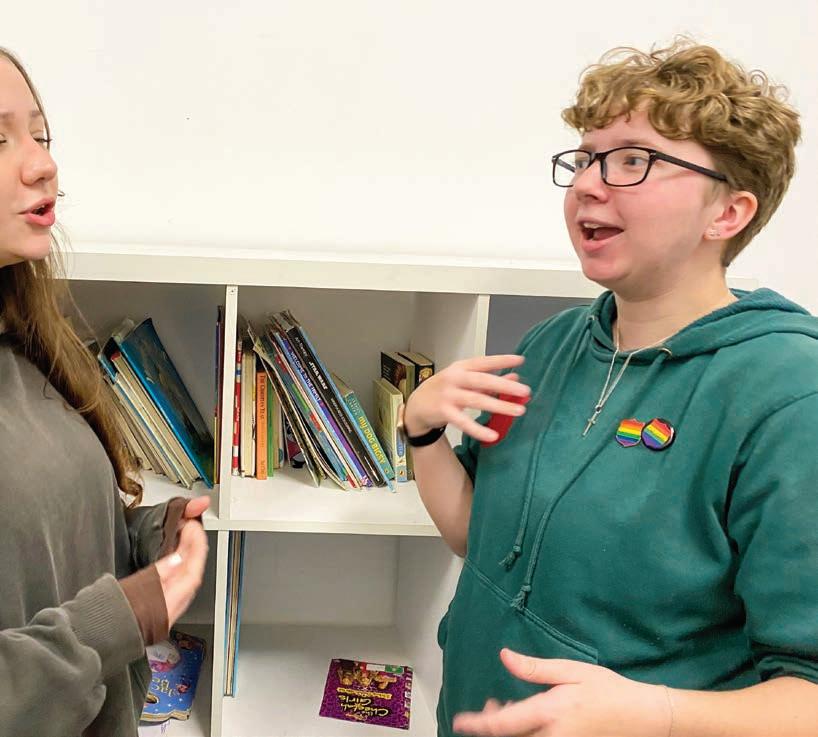
her on my latest scan result.
“Oh yes,” she responded.
“My sister-in-law’s sister died of that a few years ago.”
I was surprised – and horrified – at her throwaway comment. Who knows why she said it – maybe she didn’t know what to say, so she said the first thing
that came into her head. But all it did was diminish the seriousness of what I was telling her. A diagnosis couldn’t compete with death, so I felt there was no space to say anything else. So, I didn’t. If conversation were a competitive sport, then she’d have won.
Listening power
The book of Proverbs in the Bible has a bit to
say about people talking too much and listening too little. I think Proverbs chapter 18, verse 2 provides insight for us all and, really, is applicable in all aspects of life:
“Foolish people have no interest in understanding; they only want to air their own opinions” (New Living Translation).
Finally off the streets
Krzystof finds security and a home after 16 years
In 1991, Krzystof came to Australia from Poland. As a qualified electrical engineer, he was seeking work when a dispute arose between him and Centrelink.
“There is no other way, but only to take to the street,” said Krzystof.
“I knew nothing about life on the street. Sixteen years has passed, and I learned how to live, how to survive, what to do.
“I was passing under freeways and looked on the left and the idea came to me ... because I was looking for a place for
myself, a base. Because, you know, to spend one night here, one night there, it is not convenient. I slept behind [one of] the pillars [under one of Perth’s bridges].
“I had a carton, like four boxes, long enough for me. All my things were under [there].
“It was not pleasant in the beginning, like every new place. But I tamed it, I think, and made it convenient, comfortable to myself. And after many, many, many years, it was my home, 12 years.”
Turning point
Nicola, the Salvos’ Doorways (emergency relief) worker in Perth, tells how she first met Krzystof.
“There was a poster for a missing person that was put up in the reception area at Doorways in Perth. And either that day or the next, Krzystof walked in.
“I looked at him, looked at the picture, and then was like, ‘I think that’s him.’ And that’s where our journey began. Having that face-toface with Krzystof and then going from there ... And it’s been a gradual, slow process from there. I’ve
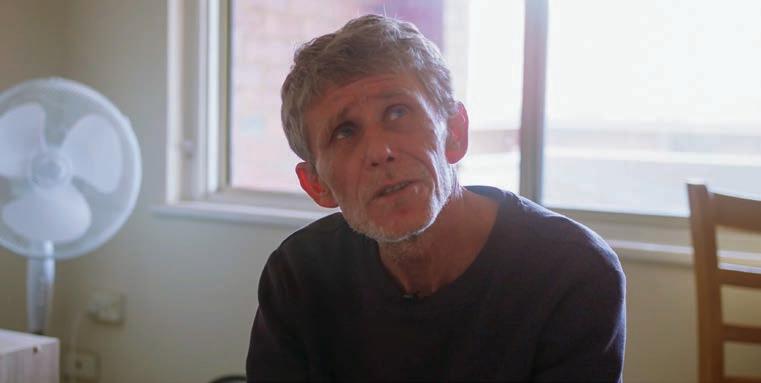
After years on the street, Krzystof is happy to have a secure home of his own.
I feel secure with The Salvation Army … they simply supervise my return to normal life.
Krzystof now enjoys the simple pleasures of a "normal" life.
been working with Krzystof now for four years. But it’s been a great journey.
“To think that Krzystof spent so much of his life under that bridge with the background traffic noise. And like he said, you get accustomed to all this. Pretty incredible really, because I don’t think I could do that.”
For Krzystof, that first meeting with Nicola was the first step towards a new and better life.
“The Salvation Army, it took interest in me. It started to take me away from the street, step by step. First, Centrelink agreed to restore my payment. The Salvation Army found me some accommodation.”
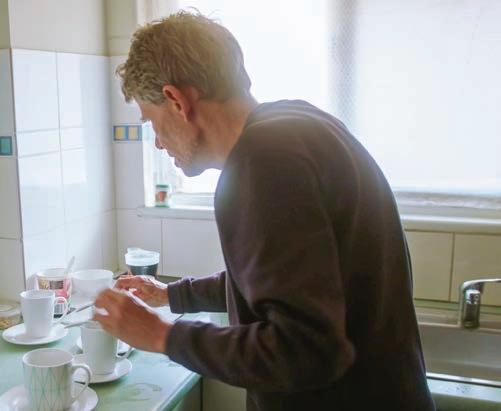
Off the streets
Krzystof is very happy to now have his own secure home.
“There have been big impacts,” said Nicola. “Seeing Krzystof, from being on the streets, what he’s endured, [from then to] now, seeing him in his home. And how he’s managed, how he’s coped.
“The impacts for Krzystof, too, you know? He’s done this on his own, with the help of The Salvation Army. But prior to that, no family or anything around. But he has done amazingly, considering.”
Krzystof has only “the best things” to say about the Salvos.
“They came to my rescue,
organised everything,” he shared. “[They] still keep an eye on me ‘cause the process is not finished yet.
“I feel secure with The Salvation Army. They give me assistance; they simply supervise the process of my return to normal life.”
Nicola is humbled by her interactions with Krzystof. “Krzystof has taught me a lot,” she said. “For somebody that has been on the streets for so long –you can never judge a book by its cover ... just look at him now, in his home. Give people the dignity and respect that they deserve. Because, after all, everyone is human.
“It has definitely been an honour to be journeying beside him.”
�� Bacon delights

Ingredients
200g dried apricots or dates; ½ cup sultanas; 1 tsp honey; ¼ tsp cinnamon; ¼ tsp nutmeg; 1 tbsp ground almonds; 6 rashers bacon, halved
Method
Pre-heat oven to 175°C.
Finely chop apricots and sultanas.
In a bowl, mix apricots, sultanas, honey, cinnamon, nutmeg and almonds.
Spread a thin layer of mixture over the bacon.
Roll up bacon, cut in half and secure with a toothpick.
Place on baking tray. Cook for 20 minutes.
☺ Believe in Good: Tips
15 July – Give Something Away Day
“Remember there’s no such thing as a small act of kindness. Every act creates a ripple with no logical end.”
– Scott Adams
This week, donate to your local Salvos Stores. Buy someone a meal or give flowers to someone who needs cheering up.
1. What is the only number that has the same number of letters as its meaning?
2. What kind of building do the ghostbusters use for their headquarters?
3. How many stickers cover each face of a classic Rubik’s Cube?
4. What is The Munsters’ address?
5. Which symbol shares a key with the number 4 on a standard computer keyboard?

On which page of this week’s Salvos Magazine is Tum-Tum hiding?
What am I?

I am a famous landmark.
I am heritage-listed, having been opened in the early 1900s.
I exist for your amusement and there is more than one of me.
I have served as a location for the filming of several movies and television shows.
I have a large face.
✏Answers
Quiz: 1. Four 2. Fire Station 3. Nine 4. 1313 Mockingbird Lane 5. The dollar sign I am: Luna Park Tum-Tum: is hiding in the books on page 11.
�� Sudoku
Fill in the grid so that every row, every column and every 3x3 box contains the digits 1 to 9.
Have a laugh
A thief stole all the emojis on my phone.
I don’t know how I feel about it!
I went on a theme park ride covered in emojis.
Why do drummers love sending emojis?
It was a rollercoaster of emotions! They are great at hitting the symbols!
What do cows add to their texts?
Emoojis
“Be quick to listen and slow to speak or to get angry.”
James chapter 1, verse 19 Contemporary English Version

